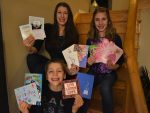If you’ve got grade school-aged children, chances are they come home recounting fights on the playground and in their classrooms. Sometimes, it involves them, and other times, they are bystanders. There are kids who are hitting, name calling, mimicking and punching each other. The chasing and hurting seems to come out of the blue, or sometimes it has been expected and dreaded for way too long. People can be cruel to one another.
It might not come as a surprise that moms talk to each other about their children but, in the last couple of weeks, I’ve probably talked to four parents who have mentioned their worry or concerns. While it’s possible for some to pile on stereotypes about Jewish mothers, if you ignore all the nonsense, the underlying theme is simple for all parents. We’re trying to raise good, kind people and that’s why we devote so much effort and concern to it. We want healthy, happy children, and wonder how to keep them from killing each other.
Unfortunately, turning to traditional texts doesn’t always offer us solace. We’re not reading about happy families all the time when we read the weekly Torah portion – and, often, the rabbis’ commentary doesn’t soften the harsh responses in Genesis. For instance, when you read the stories about Joseph and his brothers, well, they were brutal to one another.
Joseph is his father’s favourite, and it’s no secret. Joseph doesn’t help matters – he tattles on his older brothers (Genesis 27:2). His dad makes him fancy clothing, too, so it is obvious he is getting preferential treatment.
Joseph’s brothers strip him of his clothes and throw him in a pit and, if that’s not bad enough, they sell him as a slave. Even Reuben, who hopes to fix things, cannot stop his brothers when they are dead-set on doing harm.
Of course, many commentators rush to point out how forgiving Joseph is and that, later, as a powerful man in Egypt, he saves his whole family in a time of famine. Yet Joseph misleads his brothers about who he is; he kidnaps his brothers. Well, the summary is that this is a complex story with difficult characters. It can be hard to figure out who is in the right here, and if anyone behaves well, after all.
Zooming back to the playground, there are some startling comparisons. When the kids race up and start telling the parents that this kid hit that one, this kid is bad, etc., it can be hard to untangle the story. Often, too, the kid who throws the first punch didn’t do it out of the blue. If you provoke someone enough, particularly a kid who hasn’t quite mastered self-control, someone’s probably going to fight back.
There are a few conclusions I can make in comparing this important biblical narrative with a parent’s everyday one. First, it’s complicated. It is way too simplistic to think that one child is a perfect blameless angel and the other the nasty bad person. This isn’t how relationships and people work.
Second, untangling the story can take awhile. It’s important to learn everybody’s point of view before deciding what actually happened. Sometimes, it’s crucial not to just trust those in authority to be omnipotent and sort things out. An example? I got an official report home one day that one of my kids punched another kid. (We were really upset with him.) Days later, I found out from another child that the reason why mine acted out was because other kids were copying my kid, making fun of him and pretending to be him in an unkind way, behind his back. While I might not condone punching somebody in the nose, I sometimes can understand how it might happen if I hear the details of what exactly transpired.
Third, making peace is a multi-step process. The wronged party may need to work through a few things before the situation can be resolved. This takes time and fair judgments like Solomon’s. It can feel beyond a parent’s capabilities!
Finally, when following the story of Joseph and his brothers, we learn that they worked it out. Joseph helps feed his family and saves them – but it’s not a narrative of instant forgiveness and affection. Jealousy, unequal treatment and violence? It’s all in there.
Sometimes the complicated family dramas of Genesis demonstrate that even tangled and dangerous altercations can be resolved. It’s a reminder that everyone – kids, too – can get over their intrigue, fights and disagreements and forgive one another. Forgiveness doesn’t mean we forget everything about the complicated characters who are our friends, relatives and classmates. It might mean that, while we can’t change the past, we can get beyond it to build better future experiences together.
While I mulled this over, my husband pointed out something further. When we must rely on our families or our (smaller) Jewish communities, we must work together on many crucial issues of survival. We can’t change the past interactions or bad behaviours that may have taken place in a family or congregation. We can’t go back in time to repair or undo those wrongs, but we can drop the rancour to work together towards shared future goals. Joseph – and those playground reconciliations – show us that history is just history, not destiny.
Joanne Seiff writes regularly for CBC Manitoba and various Jewish publications. She is the author of three books, including From the Outside In: Jewish Post Columns 2015-2016, a collection of essays available for digital download or as a paperback from Amazon. See more about her at joanneseiff.blogspot.com.




